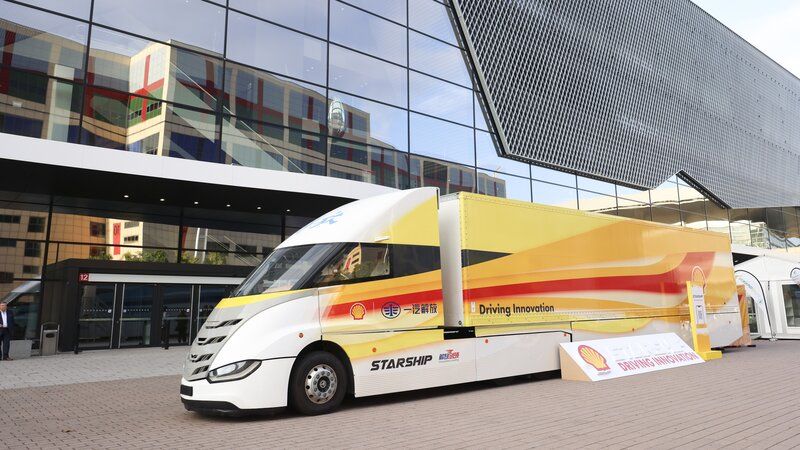Starship 3.0 Hybrid: Pioneering a Greener Future in Commercial Transport

Picture a future where trucks not only cover greater distances with improved fuel efficiency but also boast bold, tech-forward designs. This is exactly what makes the Starship conceptual truck so compelling.
From September 10 to 14, 2024, the Starship 3.0 Hybrid made its debut at Automechanika Frankfurt,followed by a European tour. This cutting-edge vehicle is the product of a forward-looking partnership between Shell and FAW Jiefang, combining their expertise in technology and innovation. Far more than just a “carbon-reducing” truck, the Starship 3.0 Hybrid sets a new benchmark for driving the commercial vehicle industry toward a greener future. Its mission: to boost energy efficiency, cut carbon emissions, and bring transformative solutions to China’s road transport sector.
In the ongoing "race to reduce carbon emissions," road transport is a key battleground, and the Starship 3.0 Hybrid emerges as a powerful asset in this effort. Data[1] shows that in terms of fuel consumption, Starship 3.0 Hybrid achieved 23.3L/100km with Shell FuelSave Diesel and 22.7L/100km with Shell Diesel Renewable Blend whilst running fully laden on two expressway runs of 230 km extent. Both figures represent significant improvements over the fully laden Chinese average of 32.5 L/100km[2]; in terms of freight tonne efficiencies, Starship 3.0 Hybrid achieved 140.3 tonne-km per litre with Shell FuelSave Diesel and 144.1 tonne-km per litre with Shell Diesel Renewable Blend, representing a 39% improvement over the fully laden Chinese Average of 103.4 tonne-km per litre. By refining vehicle design, power systems, and energy consumption, the Starship ensures that every drop of fuel is used to its fullest potential.
The Starship 3.0 Hybrid is the result of a strong partnership between Shell, a global energy leader, and FAW Jiefang, a powerhouse in China’s commercial vehicle industry. This collaboration not only capitalizes on the strengths of both companies but also plays a pivotal role in advancing the green transformation of China’s commercial vehicle market.
Shell and FAW Jiefang have been partners for over a decade, collaborating on the development of long-life engine, transmission, and axle oils. Their efforts set a new benchmark in China with a 100,000-kilometer oil change cycle for these key components. In 2018, they took this a step further, introducing a 200,000-kilometer extended oil change technology. By 2023, the two companies deepened their strategic cooperation, expanding their focus beyond traditional sectors to include new energy and international markets.
In April 2024, Shell and FAW Jiefang launched a joint research center, leveraging Shell’s global technical expertise to support the Starship China concept truck and related projects. The center also introduced the "Rainbow Bridge" mechanism, aimed at fostering innovation through regular talent exchanges and joint training programs, further strengthening the collaboration between the two companies.
Shell's partnership with FAW Jiefang has provided the company with valuable localized insights into China, the world's largest commercial vehicle market. This deep understanding, especially in the application of green transition technologies, enables Shell to better customize its solutions to meet the specific needs of Chinese Conversely, Shell brings FAW Jiefang a global outlook and an international mindset. This collaboration has not only driven significant technological advancements for FAW Jiefang but has also showcased China’s innovation-driven manufacturing on the world stage. As the Starship 3.0 Hybrid shines at major European auto shows, it marks the global debut of this joint achievement, providing FAW Jiefang with a prime opportunity to highlight China's industrial strength and commitment to environmental sustainability.
[1] Based on the report of Heavy-duty truck road fuel consumption test from SwARC. The fuel consumption figures provided are derived from two distinct sources: an industry report detailing average fuel economy for vehicles in China and a third-party test report conducted by SwARC for the Starship 3.0 Hybrid vehicle. These figures are for informational and reference purposes only and may not represent actual performance under all conditions. Actual fuel consumption can vary significantly based on a range of factors including but not limited to driving conditions, vehicle maintenance, driving habits, vehicle load, and environmental conditions. The freight tonne efficiency figures for both the industry average and the Starship 3.0 Hybrid vehicle are based on the fuel consumption figures which are derived from separate reports. Comparisons between these figures may not be directly applicable. No representations or warranties are made regarding the accuracy, completeness, or reliability of the fuel economy and efficiency figures provided.
[2] Research progress on carbon neutrality technology roadmap for commercial vehicles. Commercial Vehicle New Energy Transition Technology Forum, Shiyan, Hubei, 2023